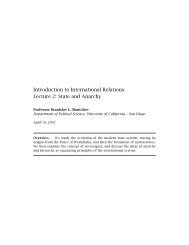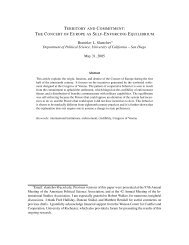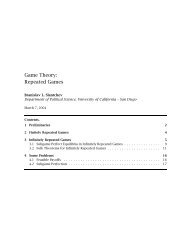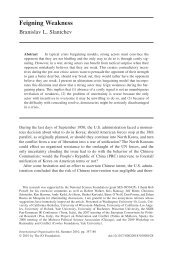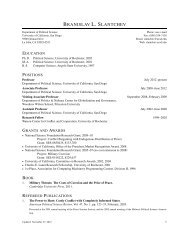Introduction to International Relations Lecture 10 - Branislav L ...
Introduction to International Relations Lecture 10 - Branislav L ...
Introduction to International Relations Lecture 10 - Branislav L ...
You also want an ePaper? Increase the reach of your titles
YUMPU automatically turns print PDFs into web optimized ePapers that Google loves.
the U.S. holds back in its retaliation against al Qaeda strikes, Osama bin Laden<br />
sees this as a sign of impotence, which encourages him <strong>to</strong> arrange further attacks.<br />
As for bin Laden himself, it is highly unlikely that the U.S. could make a<br />
credible promise not <strong>to</strong> kill him. There is nothing strategic coercion can really<br />
do <strong>to</strong> such ac<strong>to</strong>rs, and the solution is brute force: one must eliminate them.<br />
The third, and perhaps most interesting, group comprises the potential revisionists.<br />
These are ac<strong>to</strong>rs who are dissatisfied with the status quo but that could<br />
be deterred from challenging it with a combination of coercive strategies and reassurance.<br />
During the Cold War, the Soviet Union was one such ac<strong>to</strong>r. Perhaps it<br />
had <strong>to</strong> be deterred from exporting its revolutionary communism through force<br />
(the Korean War put an end <strong>to</strong> that). But it also had <strong>to</strong> be reassured that the<br />
U.S. would not infringe on its legitimate concerns, especially the security problem<br />
that necessitated turning Eastern Europe in<strong>to</strong> a buffer zone controlled by<br />
Moscow. It should be noted that the U.S. scrupulously observed this tacit noninterference<br />
agreement despite many occasions where it could have meddled,<br />
probably with disastrous consequences, in Soviet affairs there (e.g. the Hungarian<br />
Revolt in 1956, the Prague Spring of 1968, and the Polish crackdown in the<br />
early 1980s).<br />
Potential revisionists may be willing <strong>to</strong> fight for some gain (or <strong>to</strong> avoid some<br />
loss), but are hardly eager <strong>to</strong> do so. Therefore, a proper peace-preserving strategy<br />
would balance deterrence with reassurance. That is, one would simultaneously<br />
threaten them with punishment for attempting <strong>to</strong> overturn the status quo,<br />
and make their life with the status quo more comfortable. The problem arises<br />
when the demands of the two components of this strategy contradict each other.<br />
That is, when enhancing the deterrent threat causes escalating fears, called defensive<br />
panic, that might provoke conflict; or when overzealous reassurance<br />
undermines the credibility of the deterrent posture. Let’s now explore how attempts<br />
<strong>to</strong> improve one’s deterrent posture may actually provoke conflict rather<br />
than forestall it. The worst thing one may have on his hands is an opponent<br />
who is revisionist and scared.<br />
1 The Security Dilemma<br />
The principle of sovereignty that underlies the contemporary international system<br />
may be seen as a major source of instability. Consider the idea of external<br />
sovereignty in particular: no entity can dictate <strong>to</strong> a state what it should do. Although,<br />
as we noted already, this principle does not extend equally <strong>to</strong> all ac<strong>to</strong>rs<br />
because some states are more equal than others, one can usefully restrict the<br />
notion <strong>to</strong> the Great Powers. Almost by definition, a state is a Great Power if it is<br />
able <strong>to</strong> protect its external sovereignty from encroachments by other great powers.<br />
As we saw, this invariably means maintaining capabilities <strong>to</strong> fight a major<br />
war. Why is this the case?<br />
Even in a hierarchical system, there will be a set of states near the pinnacle of<br />
the power pyramid, and these states will have approximately equal capabilities<br />
(periods of clear hegemony are not all that common). Among these states, there<br />
2



